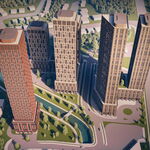wild goose chase
Active Member
Huh, interesting. Never thought it would be so soon.
LA’s population growth has been pretty shaky recently (dropping by two-thirds), while Toronto’s has remained robust, so they might converge even sooner than that. I feel like housing prices might throw a wrench into Toronto’s population growth though
Is this due to Toronto's domestic migration or immigration numbers being stronger than LA's, or less out-migration?
I know the Texan cities, like Houston have been growing quickly due to both domestic migration from other states and cities, immigration, local birthrates and more affordable housing.




